Sergi Liesegang
Robust Design of Reconfigurable Intelligent Surfaces for Parameter Estimation in MTC
Jan 27, 2026Abstract:This paper introduces a reconfigurable intelligent surface (RIS) to support parameter estimation in machine-type communications (MTC). We focus on a network where single-antenna sensors transmit spatially correlated measurements to a multiple-antenna collector node (CN) via non-orthogonal multiple access. We propose an estimation scheme based on the minimum mean square error (MMSE) criterion. We also integrate successive interference cancelation (SIC) at the receiver to mitigate communication failures in noisy and interference-prone channels under the finite blocklength (FBL) regime. Moreover, recognizing the importance of channel state information (CSI), we explore various methodologies for its acquisition at the CN. We statistically design the RIS configuration and SIC decoding order to minimize estimation error while accounting for channel temporal variations and short packet lengths. To mirror practical systems, we incorporate the detrimental effects of FBL communication and imperfect CSI errors in our analysis. Simulations demonstrate that larger reflecting surfaces lead to smaller MSEs and underscore the importance of selecting an appropriate decoding order for accuracy and ultimate performance.
* This work has been accepted for publication in EURASIP Journal on Wireless Communications and Networking. The final published version is available via Springer Nature Link
Design of RIS-aided mMTC+ Networks for Rate Maximization under the Finite Blocklength Regime with Imperfect Channel Knowledge
Jan 27, 2026Abstract:Within the context of massive machine-type communications+, reconfigurable intelligent surfaces (RISs) represent a promising technology to boost system performance in scenarios with poor channel conditions. Considering single-antenna sensors transmitting short data packets to a multiple-antenna collector node, we introduce and design an RIS to maximize the weighted sum rate (WSR) of the system working in the finite blocklength regime. Due to the large number of reflecting elements and their passive nature, channel estimation errors may occur. In this letter, we then propose a robust RIS optimization to combat such a detrimental issue. Based on concave bounds and approximations, the nonconvex WSR problem for the RIS response is addressed via successive convex optimization (SCO). Numerical experiments validate the performance and complexity of the SCO solutions.
* This work has been accepted for publication in IEEE Communications Letters. The final published version is available via IEEE Xplore
Power Control Design for ISAC Optimization in User-Target-Centric Cell-Free mMIMO Networks
Nov 11, 2025Abstract:This paper addresses the power control design for a cell-free massive MIMO (CF-mMIMO) system that performs integrated sensing and communications (ISAC). Specifically, the case where many access points are deployed to simultaneously communicate with mobile users and monitor the surrounding environment at the same time-frequency slot is considered. On top of the user-centric architecture used for the data services, a target-centric approach is introduced for the detection tasks. As a valuable performance metric, we derive the receive sensing signal-to-noise (SNR) ratio under generalized likelihood ratio test processing. Based on that, we formulate a quality-of-service (QoS) scheme that maximizes the two figures of merit: achievable data rate and effective sensing SNR. Simulations demonstrate that our proposal surpasses orthogonal resource algorithms, underscoring the potential of ISAC-enabled CF-mMIMO networks.
Scalable Integrated Sensing and Communications for Multi-Target Detection and Tracking in Cell-Free Massive MIMO: A Unified Framework
Mar 09, 2025Abstract:This paper investigates a cell-free massive MIMO (multiple-input multiple-output) system where distributed access points (APs) perform integrated sensing and communications (ISAC) tasks, enabling simultaneous user communication and target detection/tracking. A unified framework and signal model are developed for the detection of potential targets and tracking of previously detected ones, even in arbitrary positions. Leveraging the Generalized Likelihood Ratio Test technique, novel detection/tracking algorithms are proposed to handle unknown target responses and interference. Scalable AP-user and AP-target association rules are evaluated, explicitly considering multi-zone sensing scenarios. Additionally, a scalable power control mechanism extends fractional power control principles to ISAC, balancing power allocation between communication and sensing tasks. For benchmarking, a non-scalable power control optimization problem is also formulated to maximize the minimum user data rate while ensuring a Quality of Service constraint for sensing, solved via successive convex approximation. Extensive numerical results validate the proposed framework, demonstrating its effectiveness in both communication and sensing, revealing the impact of interference from other targets, and highlighting fundamental trade-offs between sensing and communication performance.
Rate Optimization for RIS-Aided mMTC Networks in the Finite Blocklength Regime
Dec 10, 2024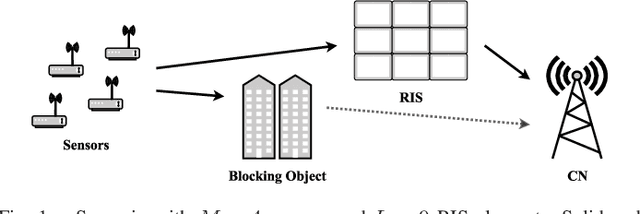
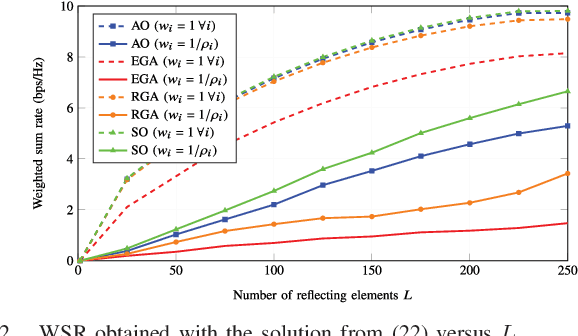
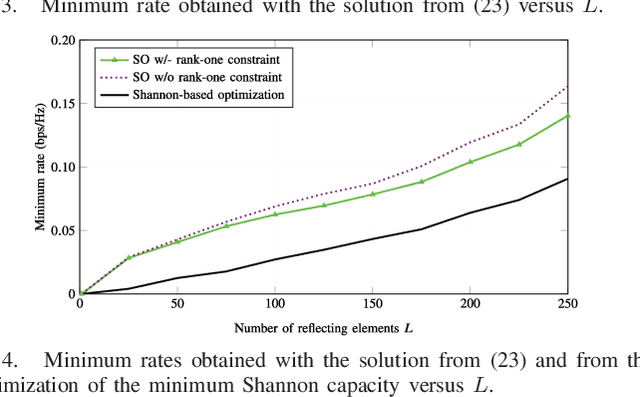
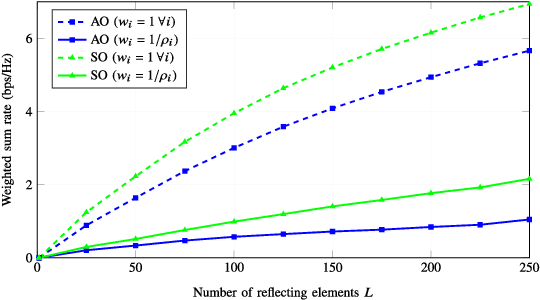
Abstract:Reconfigurable intelligent surfaces (RISs) have become a promising candidate for the development of future mobile systems. In the context of massive machine-type communications (mMTC), a RIS can be used to support the transmission from a group of sensors to a collector node. Due to the short data packets, we focus on the design of the RIS for maximizing the weighted sum and minimum rates in the finite blocklength regime. Under the assumption of non-orthogonal multiple access, successive interference cancelation is considered as a decoding scheme to mitigate interference. Accordingly, we formulate the optimizations as non-convex problems and propose two sub-optimal solutions based on gradient ascent (GA) and sequential optimization (SO) with semi-definite relaxation (SDR). In the GA, we distinguish between Euclidean and Riemannian gradients. For the SO, we derive a concave lower bound for the throughput and maximize it sequentially applying SDR. Numerical results show that the SO can outperform the GA and that strategies relying on the optimization of the classical Shannon capacity might be inadequate for mMTC networks.
* Paper accepted to be published at IEEE Communications Letters
Approximations of the Aggregated Interference Statistics for Outage Analysis in Massive MTC
Dec 07, 2024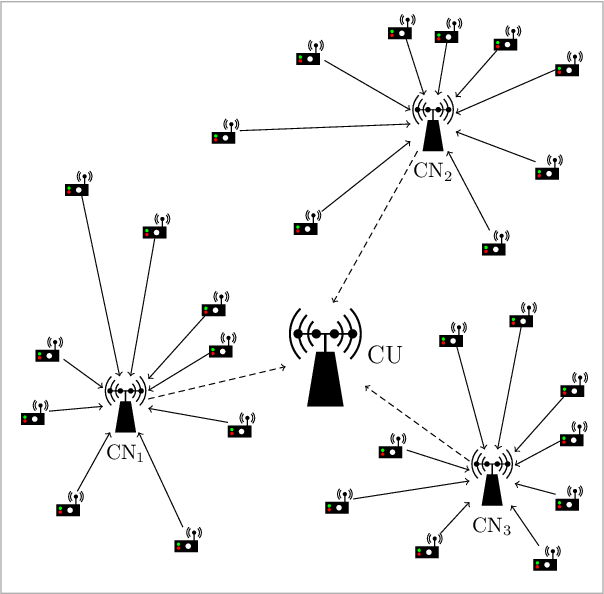
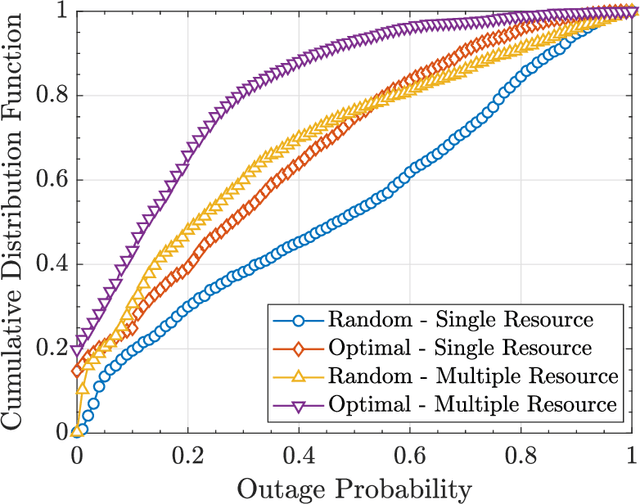
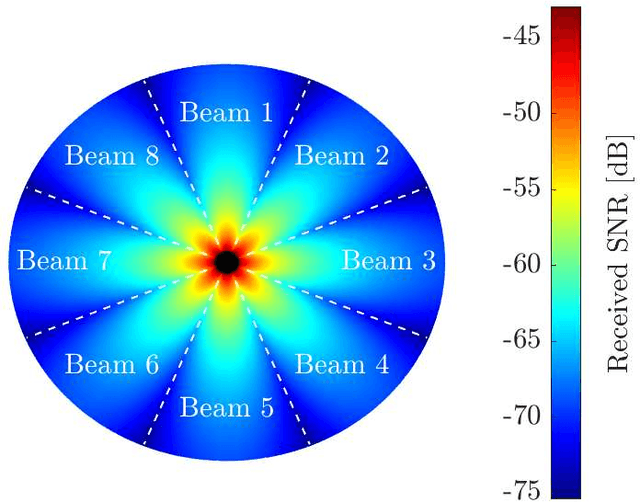
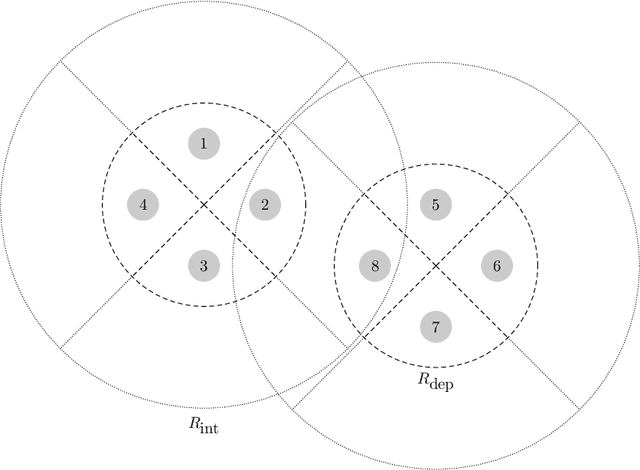
Abstract:This paper presents several analytic closed-form approximations of the aggregated interference statistics within the framework of uplink massive machine-type communications (mMTC), taking into account the random activity of the sensors. Given its discrete nature and the large number of devices involved, a continuous approximation based on the Gram--Charlier series expansion of a truncated Gaussian kernel is proposed. We use this approximation to derive an analytic closed-form expression for the outage probability, corresponding to the event of the signal-to-interference-and-noise ratio being below a detection threshold. This metric is useful since it can be used for evaluating the performance of mMTC systems. We analyze, as an illustrative application of the previous approximation, a scenario with several multi-antenna collector nodes, each equipped with a set of predefined spatial beams. We consider two setups, namely single- and multiple-resource, in reference to the number of resources that are allocated to each beam. A graph-based approach that minimizes the average outage probability, and that is based on the statistics approximation, is used as allocation strategy. Finally, we describe an access protocol where the resource identifiers are broadcast (distributed) through the beams. Numerical simulations prove the accuracy of the approximations and the benefits of the allocation strategy.
* Paper accepted to be published at MDPI Sensors
Sensor Selection and Distributed Quantization for Energy Efficiency in Massive MTC
Dec 07, 2024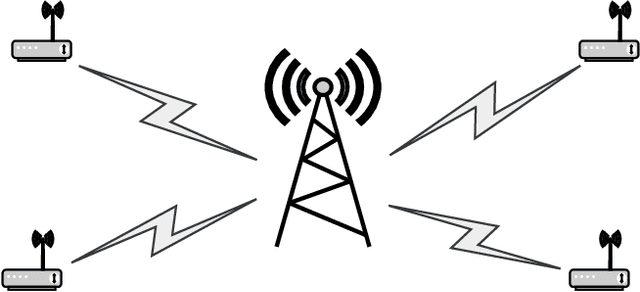

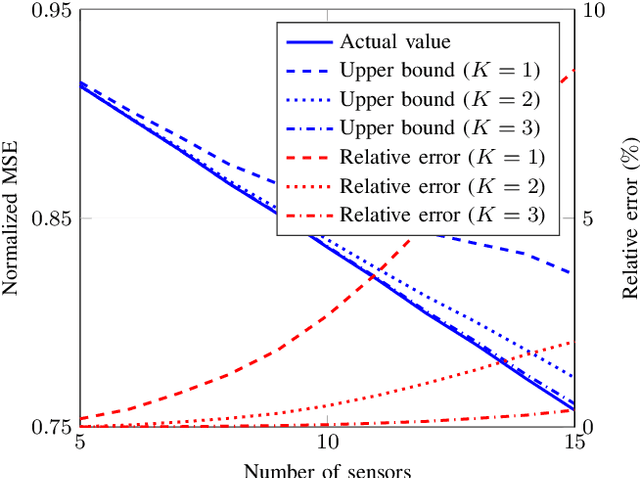
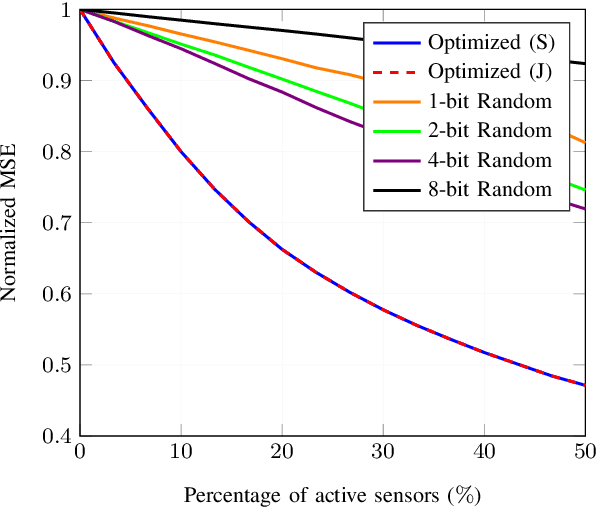
Abstract:This paper presents an estimation approach within the framework of uplink massive machine-type communications (mMTC) that considers the energy limitations of the devices. We focus on a scenario where a group of sensors observe a set of parameters and send the measured information to a collector node (CN). The CN is responsible for estimating the original observations, which are spatially correlated and corrupted by measurement and quantization noise. Given the use of Gaussian sources, the minimum mean squared error (MSE) estimation is employed and, when considering temporal evolution, the use of Kalman filters is studied. Based on that, we propose a device selection strategy to reduce the number of active sensors and a quantization scheme with adjustable number of bits to minimize the overall payload. The set of selected sensors and quantization levels are, thus, designed to minimize the MSE. For a more realistic analysis, communication errors are also included by averaging the MSE over the error decoding probabilities. We evaluate the performance of our strategy in a practical mMTC system with synthetic and real databases. Simulation results show that the optimization of the payload and the set of active devices can reduce the power consumption without compromising the estimation accuracy.
* Paper accepted to be published at IEEE Transactions on Communications
Entropy-Based Sensing Schemes for Energy Efficiency in Massive MTC
Dec 07, 2024



Abstract:Machine-type communications (MTC) are crucial in the evolution of mobile communication systems. Within this context, we distinguish the so-called massive MTC (mMTC), where a large number of devices coexist in the same geographical area. In the case of sensors, a high correlation in the collected information is expected. In this letter, we evaluate the impact of correlation on the entropy of a set of quantized Gaussian sources. This model allows us to express the sensed data with the data correlation matrix. Given the nature of mMTC, these matrices may be well approximated as rank deficient. Accordingly, we exploit this singularity to design a technique for switching off several sensors that maximizes the entropy under power-related constraints. The discrete optimization problem is transformed into a convex formulation that can be solved numerically.
* Paper accepted to be published at IEEE Wireless Communications Letters
Coexistence of eMBB+ and mMTC+ in Uplink Cell-Free Massive MIMO Networks
Apr 29, 2024Abstract:This paper tackles the problem of designing proper uplink multiple access (MA) schemes for coexistence between enhanced mobile broadband+ (eMBB+) users and massive machine-type communications+ (mMTC+) devices in a terminal-centric cell-free massive MIMO system. Specifically, the use of a time-frequency spreading technique for the mMTC+ devices has been proposed. Coupled with the assumption of imperfect channel knowledge, closed-form bounds of the achievable (ergodic) rate for the two types of data services are derived. Using suitable power control mechanisms, we show it is possible to efficiently multiplex eMBB+ and mMTC+ traffic in the same time-frequency resource grid. Numerical experiments reveal interesting trade-offs in the selection of the spreading gain and the number of serving access points within the system. Results also demonstrate that the performance of the mMTC+ devices is slightly affected by the presence of the eMBB+ users. Overall, our approach can endow good quality of service to both 6G cornerstones at once.
Scalability and Implementation Aspects of Cell-Free Massive MIMO for ISAC
Apr 23, 2024



Abstract:This paper addresses the problem of scalability for a cell-free massive MIMO (CF-mMIMO) system performing Integrated Sensing and Communications (ISAC). Specifically, the case in which a large number of access points (APs) are deployed to perform simultaneous communication with mobile users and surveillance of the surrounding environment in the same time-frequency slot is considered, and a target-centric approach on top of the user-centric approach used for communication services is introduced. Consideration of other practical aspects such as the fronthaul load and scanning protocol issues are also treated in the paper. The proposed scalable ISAC-enabled system has lower levels of system complexity, permits to manage the case in which multiple targets are to be tracked/sensed, and achieves performance levels superior or in some cases close to those of the non-scalable solutions.
 Add to Chrome
Add to Chrome Add to Firefox
Add to Firefox Add to Edge
Add to Edge